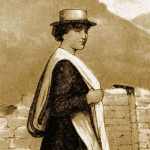Our storm is past, and that storm's tyrannous rage,
A stupid calm, but nothing it, doth 'suage.
The fable is inverted, and far more
A block afflicts, now, than a stork before.
Storms chafe, and soon wear out themselves, or us;
In calms, heaven laughs to see us languish thus.
As steady'as I can wish that my thoughts were,
Smooth as thy mistress' glass, or what shines there,
The sea is now; and, as the isles which we
Seek, when we can move, our ships rooted be.
As water did in storms, now pitch runs out;
As lead, when a fir'd church becomes one spout.
And all our beauty, and our trim, decays,
Like courts removing, or like ended plays.
The fighting-place now seamen's rags supply;
And all the tackling is a frippery.
No use of lanthorns; and in one place lay
Feathers and dust, to-day and yesterday.
Earth's hollownesses, which the world's lungs are,
Have no more wind than the upper vault of air.
We can nor lost friends nor sought foes recover,
But meteor-like, save that we move not, hover.
Only the calenture together draws
Dear friends, which meet dead in great fishes' jaws;
And on the hatches, as on altars, lies
Each one, his own priest, and own sacrifice.
Who live, that miracle do multiply,
Where walkers in hot ovens do not die.
If in despite of these we swim, that hath
No more refreshing than our brimstone bath;
But from the sea into the ship we turn,
Like parboil'd wretches, on the coals to burn.
Like Bajazet encag'd, the shepherds' scoff,
Or like slack-sinew'd Samson, his hair off,
Languish our ships. Now as a myriad
Of ants durst th' emperor's lov'd snake invade,
The crawling gallies, sea-gaols, finny chips,
Might brave our pinnaces, now bed-rid ships.
Whether a rotten state, and hope of gain,
Or to disuse me from the queasy pain
Of being belov'd and loving, or the thirst
Of honour, or fair death, out-push'd me first,
I lose my end; for here, as well as I,
A desperate may live, and a coward die.
Stag, dog, and all which from or towards flies,
Is paid with life or prey, or doing dies.
Fate grudges us all, and doth subtly lay
A scourge, 'gainst which we all forget to pray.
He that at sea prays for more wind, as well
Under the poles may beg cold, heat in hell.
What are we then? How little more, alas,
Is man now, than before he was? He was
Nothing; for us, we are for nothing fit;
Chance, or ourselves, still disproportion it.
We have no power, no will, no sense; I lie,
I should not then thus feel this misery.

















Comment form: